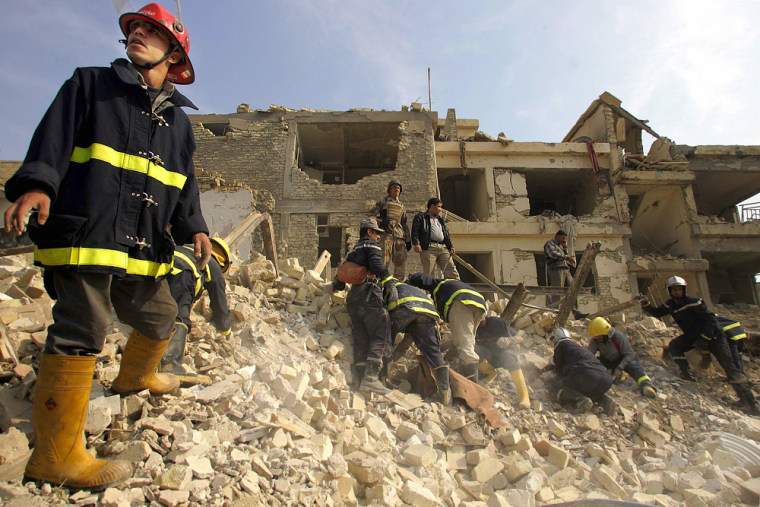BAGHDAD, Iraq — Two suicide bombers on Friday targeted a hotel compound that houses a number of news organizations, including NBC News, but failed to pierce the perimeter. However, the explosions destroyed a nearby apartment block, killing at least eight Iraqi civilians, including two children.
The attack was the second within a month to target a hotel housing international journalists. On Oct. 24, a triple vehicle bomb attack targeted the Palestine Hotel that houses the Associated Press, Fox News, and other media outlets.
NBC News’ Mike Boettcher had an unfortunate wake-up call when the first bomb blast exploded outside the Hamra hotel. He describes what happened, the aftermath, and what it is like to operate in a war zone where the press is a target.
Can you describe what happened this morning?
At 8:12 a.m., a white van drove up outside the blast walls of the front side of the Hamra Hotel, which is our home, as well the home for several other major newspapers in the U.S. and other international media.
It detonated and 21 seconds later, a larger vehicle-driven bomb — this one a big truck laden with explosives — followed behind and tried to breach the hole that had been made by the first bomb in order to enter into the hotel compound. The hole was too small for the truck to pass. So, it detonated in almost the same location as the first bomb.
Now, according to U.S. Army sources, the Hamra Hotel was the target of this attack.
Can you describe the aftermath? How bad was the damage?
The blast walls were completely destroyed by the second blast. A small apartment building outside the wall collapsed completely. Another apartment building on the other side of the road was severely damaged and there were many injured there. Most of the deaths occurred in the apartment complex that collapsed.
There were rescue attempts on that building with local residents and government rescuers digging through bricks, trying to find people who were still alive. They did find at least one who survived inside the rubble. Others did not survive and were taken away.
How did you react?
As far as us, we were at that point in the morning when we were waking up. Most of us woke up with this extreme wake-up call — literally blown out of bed.
I was literally getting out of bed when the bomb hit, blowing out the windows of two rooms of my place.
We now know to expect multiple bombs. So, after that first blast threw me back against the wall, I got down on my knees and crawled out to try to figure out what was going on. I saw the main area of my room was basically destroyed. Not just the glass, but the frames of the windows and the doors had been blown in and the roof had collapsed.
Then the second bomb went off and I was thrown back again against another wall.
That explosion blew out windows in the third room. I have a little suite here, where I live and work. So, all three rooms are totally unusable and destroyed now.
Once we realized that everyone on our NBC team was OK and we were sure there were no other explosions, then we went down and started covering the story.
It must be so difficult living and working there. Are you always fearful of attack?
Baghdad becomes a state of mind almost. You know that the danger is always there, but if you are always thinking about that, you can’t get anything done.
You see other media compounds attacked and when that happens, you wonder if next time it will be yours. And this time was our time.
But, you can’t operate that way — in terms of always thinking,'Is this it?'
Usually, when working in a war zone, being a member of the press is supposed to offer some sort of protection, or a ‘white flag’ if you will, when you go into a war zone. How hard is it to be the target of these insurgent attacks in Iraq as a member of the media?
Look, the media has been targets of al-Qaida in Iraq and elsewhere. We don’t know who committed this bombing, no one has claimed responsibility.
But, in this war, as opposed to others that I’ve covered as far back as 25 years, never before have I seen journalists as such complete targets.
Basically, the American infrastructure that is supporting the new Iraqi government is behind an almost impenetrable wall — inside the “Green Zone” — that is surrounded by blast walls and with several checkpoints.
We live outside the “Green Zone.” We live in the midst of what’s going on here.
And it’s easier to get to us because we offer soft targets. It’s easier to get soft targets than to get into the “Green Zone.”
